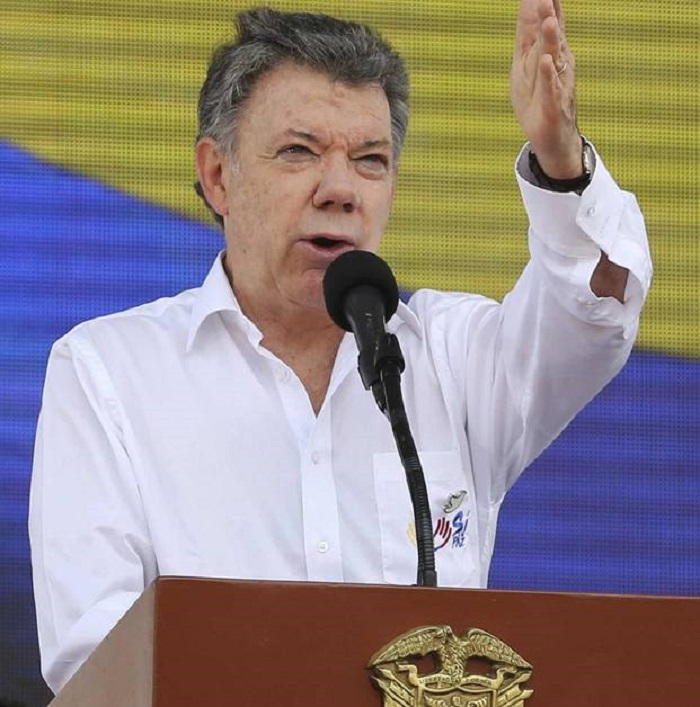Alwaght- The Norwegian committee of Nobel Peace Prize has announced the Columbian President Juan Mauel Santos the winner of the 2016 Nobel Peace Prize to appreciate efforts for peace making.
President of Columbia Santos has made vast efforts for peace in his country and finally managed to sign a peace deal with the leader of FARC Timoleon Jimenez to end a half-century civil war that has taken lives of hundreds of thousands.
The spokesperson for the committee of the prize has said while announcing the recipient of the award that the Colombian President Santos was very close to finding a settlement for one of the world’s longest civil wars. But he warned that there still was a real danger that the deal could reach a deadlock. The spokesperson continued that the peace prize must be viewed as an appreciation of the Columbian nation, adding that the voters rejected the deal but they will not reject peace.
The accord has put an end to the civil war between the government and the leftist rebels of FARC (Revolutionary Armed Forces of Columbia). The struggle last for about 52 years, and has left about 160,000 dead, and displaced nearly 6 million people. This is the longest war in history of the South America that ended by a peace agreement.
According to the text of the deal, FARC will be disarmed and turned into a political party and so can take part in the country’s political process. FARC will get its own seat at the national parliament and the conflict spots will be reconstructed. The trms of the deal oblige the rebels to lay down weapons, and on tbe other side the government will pay compensations to the victims. At the same time, the war crimes suspects, either from FARC or the government, will stand trials.
Brokered by Cuba and Norway, the prace deal was signed in the Cuban capital of Havana in a presence of the international figures including the UN Secretary General Ban Ki-moon. While in white which is a sign of peace, the participants sung peace sing and the deal was finalized. The pen used to sign the accord was made of bullet.
One term of the deal asked the government to put it to referendum. The step was taken, and the surprising results showed that the anti-deal voters won the poll by a very narrow margin, and so the historic Columbia deal was rejected by the public.
The opponents of the deal argued that the government made many concessions to the rebel group. Following the referendum, President Santos has vowed to rehold talks in a bid to achieve more acceptable agreement.
When the deal was rejected in general referendum, there were expectations that the agreement loses the candidacy for getting the Nobel Peace Prize but that did not happen, and the the Columbian president was awarded the prize.
Rejection of the referendum has created a state of disappointment among the supprters of the agreement with the rebel group. Some of them even argued that the course they took was a mistake but giving the prize to President Santos indicated that the president and the pro-deal citizens should not have a least doubt that what they did and they way they took were totally correct.
The overarching message of this prize is supporting and encouraging the Columbian president to complete the peace process with the FARC rebel group in the country. Although the outcoming referendum results have rejected the peace deal with the insurgents, the credibility of agreement to end the 50-year-old fatal conflict between the government and FARC rebels will not be undercut.
The message was that despite refusing the deal in referendum, the steps taken by the Columbian president were right. It also noted that despite rejection, Santos’ name will be recorded among the good names of history. The message told the world that he must be backed for showing courage for deal making with the enemy only for the sake of peace in the country. The Nobel Peace Prize was awarded to President Santos to spur him in going his way for creating a stable peace in his country.
Another point that boosted speculations about the peace award was that in peace deals the two sides of the deal are usually awarded, but this not happened in Columbia case. For example in the Israeli-Egyptian peace the two sides jointly won the peace prize but in Columbia case only the president received the award. This, the analysts suggest, signaled that the president’s determination for peace was more important than the deal itself
Perhaps this point is noteworthy that the FARC leader is in charge of a rebel group that is accused of violating the human rights, drug smuggling, and displacing millions of citizens, and so he is not qualified to be the co-recipient of the Nobel Peace Prize.



























